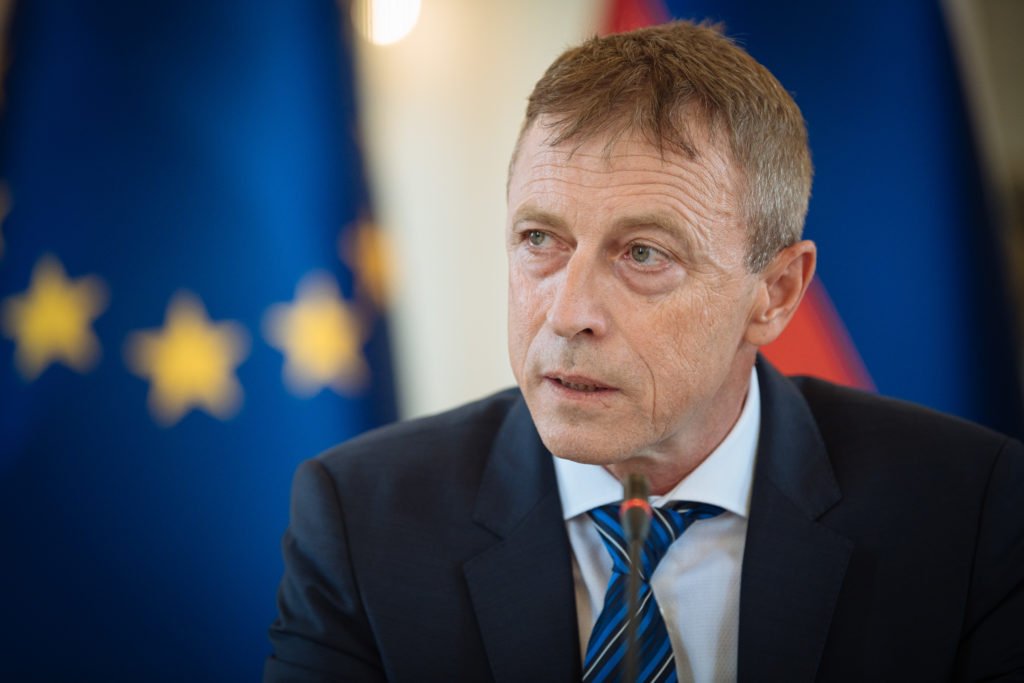On Thursday, the news broke that the Constitutional Court of the Republic of Slovenia would consider the request of the coordinator of the Levica party, Luka Mesec, to assess the constitutionality of the Act on the Provision of Funds for Investments in the Slovenian Armed Forces in the Years 2021 to 2026. Rok Čeferin, Ph.D., was the Judge-Rapporteur in this matter, and the only judges who voted against the constitutional assessment, were Dunja Jadek Pensa, Ph.D., Marko Šorli, and Klemen Jaklič, Ph.D. This decision, therefore, halted the implementation of the law and the conclusions of the first contracts, which was planned for January.
Luka Mesec from the Levica party (Left) defends the position that the contracts, with which the Ministry of Defence assumes the obligations for the period of validity of the law, could represent, in the event of the rejection of the law in a referendum, a severe financial burden on the state.
“Should the Act on the Provision of Funds for Investments in the Slovenian Armed Forces in the Years 2021 to 2026 be rejected in a referendum, it would be difficult to fix the consequences,” the coordinator of Levica, Luka Mesec believes, who advocates delaying the implementation of the law until a final decision is reached. “Dealing with this request should be the priority for the Constitutional judges,” he stated, according to the STA.
According to the Minister of Defence Matej Tonin, the implementation of the law already began on Wednesday. The first contracts, based on the law, are expected to be concluded in January, among which one of the first ones is with a Slovenian company. For now, there are no more details on the matter. On the 26th of November, the Levica and SD parties submitted the collected signatures to the National Assembly of the Republic of Slovenia, for the start of referendum proceedings on the law, which envisages 780 million euros of funds to be invested in the military in the years from 2021 to 2026, of which 100 million euros would be invested in this year alone. A day later, the National Assembly confirmed the decision on the inadmissibility of the referendum. Initially, the opposition challenged this decision in the Constitutional Court, but then the coordinator of the Levica party, Luka Mesec, demanded an assessment of the constitutionality of the law. The government, which disagrees with Mesec, has proposed to the Constitutional Court of the Republic of Slovenia to assess the request as unfounded and reject the proposal to temporarily suspend the implementation of the law.
The law provides for 780 million euros of additional funding for military investments over the next six years, most of it for the purchasing of armoured vehicles and the establishment of a middle battalion battle group. The decision was also welcomed by the Supreme Commander of the Armed Forces, Borut Pahor. When it became known that the left opposition would submit a legislative referendum against the Act on the Provision of Funds for Investments in the Slovenian Armed Forces in the Years 2021 to 2026, Minister Tonin pointed out that this was obviously a very low, petty political action, with which the Levica party tried to get people riled up and bring more anger into society, especially through the demagogic descriptions of how there is no money for one thing, but there is money for another.
They were misleading in their campaign
Let’s recap. The opposition parties cited misleading reasons in their opposition to the law. To this end, the SD party launched a campaign, part of which was also a drawing with the inscription that read: “780 million euros for tanks? No, thanks!” And, of course, a tank was drawn next to the inscription, despite the fact that the law does not provide for the purchase of a single tank. The Ministry of Defence responded to the SD party by writing the following: “The Act on the Provision of Funds for Investments in the Slovenian Armed Forces does not provide for the purchase of tanks, but for the purchase of modern vehicles for the transport of units, with a high level of protection, that will protect the lives of soldiers.” The reality is that only one percent of the GDP will be allocated for the most urgent investments, namely, for appropriate equipment, decent construction of barracks, purchase of transport helicopters, a transport aircraft and armoured vehicles, which will contribute to greater security and survival of Slovenian soldiers on missions.
Among other things, Minister Tonin pointed out that he finds it sad that the opposition is trying to build its political popularity at the expense of the country. He also emphasised that every serious country needs a healthcare system and an army that provides security. At the same time, he reminded everyone that the Army had allocated 30 million euros for the COVID-19 crisis this year, in addition to their help in establishing new capacities at the University Medical Centre Ljubljana. This represents more than 35 percent of the healthcare budget. In the current situation, this is more than a fair relationship, and whoever claims otherwise, wants to maliciously damage the prospects of a better future for the Army, and contribute to the self-abolition of the military.
Lawyers Igor Kaučič and Matej Avbelj prepared a legal opinion for the Ministry of Defence, according to which the referendum is constitutionally inadmissible. Namely, the law has all the necessary conditions for a constitutionally permissible ban on a referendum. The amended constitutional regulation lists four legal areas of laws, on which a referendum cannot be called, and the law in question falls under one of the areas, namely the first one, which states that a referendum on emergency measures to ensure the constitutional values of state defence, security and elimination of consequences of natural disasters, a referendum is not admissible.
Sara Kovač


